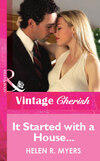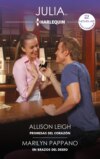Kitabı oku: «The Truth About Tate», sayfa 2
“Hardly.” His expression was as dry as the air. “More like compromise.”
She mimicked the dry reply. “The sooner you deal with me, the sooner you get rid of me?”
He responded with a shrug that made the muscles of his chest and belly ripple enticingly. She’d known the odds were better than even that J. T. Rawlins was a handsome man. His father was. His eight half siblings were as beautiful as genetics, pampering and virtually unlimited wealth could provide. There wasn’t a crooked or unbleached tooth in the bunch. Not an inch of untanned skin or a pinch of untoned flab. Not one single hair on one head that would dare rebel enough to create a bad-hair day. They were all artificially, phonily gorgeous.
And they couldn’t hold a candle to their illegitimate half brother. His tan came from hours in the sun, his muscles from hard work. His dark hair was perfectly tousled, as if he’d combed it with his fingers. His smile, she would bet, was naturally perfect, as everything else was, though she doubted she would get the chance to see it. That would be her loss.
“Compromise,” she repeated. “As in you’ll tell me everything I need to know, and then I’ll disappear from your life?”
“As in I’ll answer the questions I want. As for the rest of them…well, you’ll have to live without the answers.”
“Or get them someplace else.”
With a glint in his dark eyes, he shook his head. “That’s part of the deal. You talk only to us. We don’t want you asking a lot of questions about us in town, or bothering our friends and neighbors. And my mother and my brother are off-limits. You don’t ask about them, you don’t get to talk to them, and you don’t mention them or Jordan any more than necessary in your book.”
Natalie studied him for a moment. Though his skin glistened with sweat, he didn’t seem to notice the miserable heat or the dryness that sucked the moisture from her pores. He didn’t seem to notice anything at all besides her, though it was a wary prey-watching-predator sort of attention. She wondered what it would be like to have that same intense focus in a man-woman way. Not that she was looking for a relationship. No trust, no love, no concern for anything but the story.
With that in mind, she turned her own attention back to the story. She could do without the brother—he was important only in that he was J.T.’s brother—but she really wanted an interview with Lucinda Rawlins. She wanted to know how the affair had started, how an unsophisticated waitress from Oklahoma had caught the eye of the powerful senator from Alabama thirty years ago. Had the woman fallen in love with Chaney? Had he given her anything besides a baby—sweet lies, affection, excitement, money? How had it felt, raising her son all alone and seeing his father on television traveling with the president, being presented to the queen of England, touring Israel with the prime minister? Had she kept her secret about J.T.’s father willingly, or had Chaney bought her silence?
So she would get those answers some other way.
“Are those your only conditions?” she asked evenly.
“There’s one other. You’ll stay here. My mother’s out of town, so you can use her place.”
She glanced at the divided house, then back at him with a wry smile. “And if I go into town, one of you will just happen to be going along, right?”
That negligible shrug again.
It was a smart idea on his part—restricting her movements, therefore restricting her access to the friends and neighbors he didn’t want her talking to. “This was a rather convenient time for your mother to go out of town, wasn’t it? When did she leave? Sometime after my letter arrived in the mail yesterday?”
“Actually, the trip was already planned. She and my brother went to help a…friend. But if she hadn’t already made plans, she would have. You’re not dragging her into this mess.”
Natalie resisted the urge to point out that it was Lucinda who had dragged J.T. into this “mess.” She was the one who’d chosen to have the affair, who Chaney believed got pregnant deliberately to get something from him, who chose to go through with the pregnancy, planned or not, and raise the senator’s son. Instead, she turned back to the boy, who watched them silently. “You must be Jordan.” Closing the small distance between them, she offered her hand. “I’m Natalie.”
He raised both hands palm out to show that they were greasy, and she lowered her hand to her side. “Who exactly are you, Jordan?”
He looked at J.T., then uncomfortably replied, “I’m—I’m Tate’s son.”
Tate, she knew from her sketchy information, was the elder of the two Rawlins sons. They both lived and worked on the ranch with their mother, and both were single. J.T. had a habit of picking up speeding tickets, and he and his brother had landed in the county jail for a few youthful offenses involving too much booze, pretty women and hostile competition for the ladies’ affection. They owned the ranch outright, though occasionally they had to take out a mortgage to get through a tough season, and they were both good credit risks, Tate more so than J.T., though they were never going to get rich from ranching. That was about the extent of what she’d learned before leaving Montgomery.
“Do I get to put any conditions on this agreement?” she asked J.T. as he finally came close enough to hand the tool box to Jordan.
“Sure. You can take it…or leave it.”
“My, you’re so generous.” She smiled in spite of the sarcasm underlying her words. “I’ll take it, of course. I’ve already checked into a motel in Dixon. I need to pick up my stuff.”
“Any reason why Jordan can’t get it?”
She gave the same sugar-atop-sarcasm smile. “You mean, did I leave anything of an intimate nature lying about? Files? Drafts of the book? Notes of the senator’s comments about you?”
“You and I obviously have different definitions of ‘intimate nature,’” J.T. said.
With a faint flush warming her cheeks, she tried to remember what she’d done with the clothing—including a black lace bra with matching bikini panties—she’d taken off the night before. She’d been tired when she’d checked into the motel, and she’d changed into her pajamas and fallen into bed…but not before stuffing the clothes into a mesh laundry bag.
Removing the motel key from her key ring, she offered it to the boy. “If you’d save me forty more miles on the road after yesterday’s trip, Jordan, I would be ever so grateful. There are a couple of suitcases, a laundry bag, some papers on the table…oh, and the stuff on the bathroom counter.”
Jordan accepted the key, then, at a nod from his uncle, he grabbed his T-shirt and headed for the house.
“So…would you prefer that I call you J.T., Joshua or Josh?”
“I’d prefer that you call me long-distance.”
“A sense of humor. None of the other Chaney kids have one.”
That earned her a scowl and a hostile response. “I’m not one of the Chaney kids. Don’t call me that.” He circled the truck, then came back with a chambray shirt. She watched as he thrust his arms into the shirtsleeves, then started fastening the buttons. It was a simple task, one she’d seen done a million times, but he made it look…easy. Fluid. Sexy.
And that wasn’t something she should be thinking about the subject of her most important interview ever.
He finished up, not bothering to tuck the wrinkled tails into his jeans—a sight she would have paid money to see. Instead he simply stood there, waiting for her to say something, and finally she did. “J.T., Joshua or Josh?”
There was a certain reluctance to his voice when he answered. “J.T. will do.”
“Then shall we get started, J.T.?”
Chapter Two
If Tate had given it any thought, he would have expected Natalie Grant to be…hell, he didn’t know. Older. Stuffier. More the type to be interested in the affairs, both governmental and personal, of an old man. He would have imagined her as shorter, stockier, grayer and wearing sensible clothes.
The woman walking beside him toward the house was none of those things. She was beautiful. Leggy. Wearing a summery-looking dress that was short and sleeveless and clung from shoulder to midthigh. And she was a redhead.
When he’d come around the corner from the barn and seen that, his breath had caught in his chest, robbing his groan of any sound. Red hair came fourth on his list of weaknesses—right after Jordan, Lucinda and Josh—especially that particular shade of shiny-new-penny red. And long legs ranked right up there, too, along with sultry Southern accents.
Not only was he going to hell, but God was going to see to it that he suffered here on earth first.
“Interesting layout.”
He glanced at her and saw her gesture toward the house. “Mother-in-law troubles.”
“Whose?”
“The man who built the place sixty years ago. His wife insisted on her mother living with them. Unfortunately, the old lady’s only purpose in life was to make him miserable, so he built this house, but instead of putting the porch across the back, he stuck it between the two halves. The mother-in-law lived in the north half, while he and his wife lived in the south half. Now Mom lives in the north half.”
“And you, Tate and Jordan live in the other half?”
Tate swallowed convulsively. When he’d agreed to impersonate his brother, he’d realized he was going to have to answer to Josh’s name—though he was glad she’d offered him the chance to use J.T. instead. He’d actually been called that, off and on in his life, so it didn’t feel totally foreign.
But somehow he hadn’t realized that he was also going to wind up talking about himself as if he were someone else. Listening to Jordan admit to being Tate’s son, hearing her refer to Tate just now…it was too strange an experience.
“Actually, I have…my own place, but I’m…staying here while Tate’s gone.”
“He doesn’t trust Jordan to be alone,” she said with a knowing nod.
His anger flared. “He trusts Jordan completely. He’s a good kid.”
“I’m sure he is. But teenagers, no matter how good, are trouble waiting to happen.”
No one knew that better than Tate. He’d been sixteen and planning on going to college and having a career, instead of a backbreaking job on a ranch, when he’d met Stefani Blake, and he was seventeen and devastated when she’d told him she was pregnant. He’d offered to marry her, but she wasn’t interested. She’d had her future planned, like him, and there was no place in it for him or his kid. Two weeks after his eighteenth birthday, she’d given birth to Jordan, signed away all her rights and they’d never seen her again.
Tate had forgotten about college, a career elsewhere and everything else, and had put all his energy into being a father and making a go of the ranch. He’d changed diapers, fixed bottles and learned to bathe and dress a wriggly, squirmy kid, and he and Jordan had done a bit of growing up together.
He had no doubt Stefani had given him the better deal. Wherever she was, whatever she was doing, it couldn’t be as satisfying as his life.
“This is a nice place. Have you always lived here?”
“Pretty much.”
“Do you have any employees?”
“We hire on help when we need it, but usually it’s just us.”
“And what do you raise?”
“We’re a cow-calf operation.” At her blank look, he explained, “We have a dozen bulls we breed with our cows. We sell the little boy calves, keep the little girls and let them be girlfriends with the bulls when they’re old enough.”
She gave him a chastising look. “I don’t need the explanations quite that simple.”
“Sorry,” he said, though he wasn’t. Digging in his pocket for his keys, he led the way up the steps and across the deck to the side door of Lucinda’s quarters, then inside. The door opened into a broad room that doubled as a mudroom and laundry room. Off the connecting hallway, there was a bathroom on one side, a closet on the other, then a small dining room and kitchen straight ahead. From the kitchen a doorway opened into the living room, and from there another hallway led to the three bedrooms and the bathroom they shared.
The house was about twenty degrees cooler than outside, and was dimly lit, the blinds having been tightly closed against the sun. It smelled of furniture polish and mulberry, his mother’s favorite scent in the world, and it felt strangely empty.
Natalie gave a soft sigh as she closed the door behind her. “I don’t care what anyone says. Dry heat is not more comfortable than humid heat. At least you can breathe when there’s moisture in the air.”
“Have you always lived in Alabama?”
“No. We moved a lot because of my father’s job. I settled there about nine years ago.”
“What was his job?”
She turned from her study of the rooms they were walking through to give him an uneasy look. “He’s retired now, but he was a—a journalist. Maybe you’ve heard of him—Thaddeus Grant.”
Tate shook his head, wondering why she called herself a reporter and her old man a journalist. A mild case of hero worship, maybe. After all, she had followed in his footsteps.
“He won the Pulitzer Prize so many times they considered just automatically giving it to him every year, and the college he went to renamed its journalism school after him. He’s one of those people who becomes so much more than the job. Instead of merely reporting the news, oftentimes he is the news. These days he spends his time entertaining the rich and powerful, lecturing and giving promising young journalism students the full benefit of his years of experience.”
“Sounds intimidating.” Definitely hero worship, with a little something else underneath. Resentment? Jealousy? Anxiety?
He gestured toward the first bedroom they approached. “This is my mother’s room.” Then, down the hall, “Bathroom, guest room, guest room.”
She walked into the third bedroom, went to the windows that looked out on yard and pasture out back, yard and woods on the north, and nodded once. “This is fine. Am I allowed to go shopping for groceries?”
“Sure. You can go with me when I pick up a few things.”
“I’m surprised you aren’t taking my car keys away from me.”
“Why would I do that when you’ve already agreed to my conditions? Especially when breaking the agreement will mean leaving here immediately?” A few steps down the narrow back hall returned them to the kitchen. He glanced inside the refrigerator—pretty bare since Lucinda had transferred most of the perishables into his own refrigerator—then said without thinking, “You can eat with Jordan and me next door. Breakfast is at five-thirty, dinner’s around noon, and supper’s about six-thirty.”
“Thank you.” She sounded surprised, as if she hadn’t expected such an invitation—which was fair, since he hadn’t intended to make it. He would take it back if he possibly could. The last thing he needed was her in his house, sitting at his table three times a day.
But what did it matter whether they ate together when he was going to be spending plenty of other time with her? Lying to her. Pretending to be somebody he wasn’t to her. Deliberately misleading her. Even thinking about it made his stomach queasy.
Opening the silverware drawer, he withdrew the extra key his mother kept in the corner and laid it on the counter halfway between them. “Any questions?”
“Only about a thousand. Starting with—” In the brief silence came the rumble of her stomach, making her blush. “Well, gee, starting with the fact that I haven’t eaten since dinner last night so can I get some lunch?”
“Come on.” She was close on his heels as he left the house, crossed the deck and unlocked the door to his own house. He’d neglected to tell her that the same key that opened Lucinda’s door also opened his, but figured that was something she didn’t need to know. Unlike Lucinda, he hadn’t had the time to lock away anything he might not want a nosy reporter to see.
The layout of his half of the house was identical to his mother’s, but his mudroom/laundry room had been turned into an office. A battered oak desk with a computer was pushed into one corner, Jordan had built shelves into one wall, and two oak file cabinets stood side by side against another. Papers, records, magazines and stacks of mail were piled on most of the flat surfaces, including the old-fashioned desk chair made of hickory. He saw the glint of amusement in Natalie’s gaze as it swept over the mess, and felt his face grow warm. “It’s not as bad as it looks.”
“Actually, it looks like home. This is the Thaddeus Grant Method of Record Keeping.”
“And yours?”
“Uh, no. I’m a bit more…compulsive. You’ll see.” Without waiting for an invitation, she went ahead of him into the kitchen. He stood where he was for a moment, watching her move with a lazy grace as if she had all the time in the world, and enjoying the view, before giving himself a mental shake and starting after her.
His kitchen was just like Lucinda’s, but where she had floral wallpaper and oak-stained cabinets, his walls were painted yellow and his cabinets and all the trim were white. Her appliances were harvest gold and practically antique. His were white and practically new. He wondered how it compared to Senator Chaney’s kitchen, or if any of the Chaneys had ever actually set foot in their kitchen. He also wondered idly if there was any money in winning Pulitzer Prizes, having a school named after you or lecturing students. He assumed there was, since she’d said these days her old man entertained the rich and powerful.
“Sandwiches okay?” he asked as he scrubbed his hands at the double sink.
“Sure. Can I help?”
“Just have a seat.”
With a nod Natalie turned toward the table. It was oval, massive and looked about a hundred years old. She could easily imagine generations of Rawlinses gathered around it, sharing meals and the events of their days. If her memory was good enough, she could probably count on both hands the number of times she and her father had sat down to a cozy dinner together. He’d traveled so much when she was growing up, and even when he was home, it seemed that work just naturally required his attention in the evening. She’d spent so much time alone, wishing for his company and vowing to grow up to be just like him.
She’d tried…and failed miserably.
Shying away from thoughts that would only depress her, she forced her attention to the walls behind the table. More than two dozen framed photos hung there, some recent, some discolored with age. Jordan’s pictures were easy to pick out by their sheer newness, but J.T.’s were identifiable, even if half a lifetime had passed since the most recent. “Is this your brother?” she asked, studying the third subject.
“Yeah.”
“How much older is he than you?”
“About five years.”
“Jordan looks more like you than his father.” In fact, she thought, if not for the obvious difference in the age of the photographs, a person could easily mistake Jordan in his football uniform for the teenaged J.T. in his uniform.
He set two plates on the table with more force than necessary. “Jordan and—Tate aren’t part of your interview or your book, remember?”
As he slid into a chair, she claimed the seat across from him. “Sorry. I’m more than a little fascinated by families.”
“So write about your own.”
“I don’t really have one. It was always just my father and me.”
“You didn’t have a mother? Guess that proves my theory that reporters aren’t born. They’re created in a lab somewhere.”
“I had a mother,” she said with a faint smile. “She died when I was six. I just have a few memories of her.”
“Sorry.” He said it brusquely, but she suspected he was sincere. “What about grandparents? Aunts and uncles?”
“My father was an only child who wasn’t close to his parents. My mother was the youngest of four children, but her family resented my father for taking her away. After she died, we never had any contact with them.” She glanced at her plate, at a ham sandwich too large by half for her appetite, a pile of potato chips and two home-baked chocolate chip cookies. J.T.’s plate held the same, plus an additional sandwich. “You know, I’m supposed to be asking the questions, not answering them.”
“So ask.”
She chewed a bite or two before leading into her first question. “I understand that your father—”
“Chaney was a sperm donor, not a father. Call him whatever you want, but not ‘father.’”
Natalie nodded in agreement. “Senator Chaney tried to establish a relationship with you some time back, but you refused to return his calls or answer his letters. Sounds like a pattern, doesn’t it?”
“Sounds like you people from Alabama are pushy.”
“Some of us more than others,” she replied with a smile. “At least he didn’t show up on your doorstep.”
J.T. wasn’t the least bit amused. “If he had, I really would have called the sheriff.”
“Aren’t you even curious about him?”
“No.”
“There’s nothing you want to say to him? No answers you’d like to get from him?”
He shook his head.
“I think he’s very curious about you. I think he regrets not acknowledging you all those years ago—not claiming you and giving you the same sort of privileged life the rest of his children had.”
“I’m not a possession to be claimed.”
“No, of course not. But you understand what I’m saying.”
“If the good senator has any regrets,” he said snidely, “I imagine they have to do with leaving office and losing some of that power and constant media attention. I think that’s the whole reason behind this book, and the whole reason for sending you here. His illegitimate son is the only surprise the old man has left to get people’s attention.”
Natalie disagreed with him, though she didn’t say so. She truly believed Chaney wanted to meet J.T., to know what kind of son he and Lucinda Rawlins had produced together. He’d made his own attempts and had been rebuffed, and so he’d turned to her to get the information for him.
“You’re very close to your half brother, Tate, and your nephew, Jordan.” When she paused, a wary look turned his brown eyes a few shades darker and cranked up the intensity in his gaze a few notches. “You have eight half brothers and sisters and seven nieces and nephews on your fa—on the Chaney side of the family. Do you have any interest in meeting them?”
“You’ve met them, haven’t you?”
She nodded. She’d had the dubious pleasure of spending weeks with every one of them.
“Do I have anything in common with even one of them?”
As far as she could recall, not one of the Chaney offspring had ever held a job. Oh, they’d been given titles in the family business and positions in their father’s campaign, but they were empty titles, responsibility-free positions. None of them had actually worked at anything beyond enjoying life to the fullest as one of the privileged elite. They partied. They indulged their every whim. They spent their father’s money as if the supply was inexhaustible—as it seemed to be. They carried on scandalously and considered themselves above the dictates the rest of the world lived by.
“Other than the brown hair and eyes, no,” she admitted. Then she smiled. “Of course, I don’t know that much about you yet.” But she knew enough to be certain that he wasn’t the typical lazy, self-centered, greedy narcissist the rest of the Chaney children were. She knew they would have no more interest in claiming him as their half brother than he had in being claimed.
“Are your mother’s parents still alive?”
The abrupt subject change made her blink. “I—I don’t know.”
“Why haven’t you found out?”
“I don’t even know where they lived.”
“You know their names?”
“Yes, but—”
“You found me, when I would have preferred to remain lost. Surely, if they’re still living, you can find them.”
“And what would I say?”
“How about starting with, ‘I’m your granddaughter’? Then moving on to ‘I’m fascinated by families and thought it was time to get to know my own.’”
Natalie’s laugh felt choked and phony. “Remember—I ask the questions and you answer them.”
His shrug was every bit as enticing as it had been earlier by the truck, with his shirt off. “Have you never even thought about tracking them down?”
“No.”
“Why not? Their problem was with your father, not you. They would probably be thrilled to meet their youngest daughter’s only child.”
Maybe, she admitted to herself. But her father would go ballistic if he ever found out. He’d made it clear enough when she was a child that her loyalties belonged to him, no one else. His parents, her mother’s parents—who needed them? They had each other.
But she had never really had him.
She cleared her mind. “Back to the Chaneys…”
“Let’s stick with the Grants, or actually…what is your grandparents’ name?”
“Stevenson.”
“You have a whole family out there somewhere. Wouldn’t you like to meet the Stevensons?”
“Wouldn’t you like to meet the Chaneys?”
“Aunts, uncles, cousins…”
“Half brothers, half sisters, stepmothers—several of whom are just about your age.”
“You think I’d be interested in one of the old man’s ex-wives? How sick would that be?”
“Stranger things have happened.”
“Not in the Rawlins family.”
Natalie took a few moments to eat, polishing off half of the sandwich and the chips and both cookies, then pushed her plate back. “What kind of schedule do you keep?”
“I get up around five-fifteen and work until everything that needs doing is done, and I’m usually in bed by ten.”
Some days she awakened with an excess of energy and did everything that needed doing, too. Other days she hung around her apartment, not getting dressed or combing her hair, eating junk food and taking naps between movies on TV. She considered those days the refilling-her-creative-well days. No doubt J.T. would think of them as damn-what-a-lazy-slug days.
“You don’t have a regular quitting time?” she asked.
With a brow raised, he reached for her plate. When she nodded, he took it and his own plate to the counter. After putting the remaining sandwich half in a plastic bag in the refrigerator, he returned. “I usually quit around six or six-thirty, depending on what I’m doing. Sometimes I have to work later. Occasionally I can quit earlier.”
“Doesn’t leave much time for a social life.”
He shrugged.
“You’ve never been married.” She waited for his nod. “I assume there are women in your life. Anyone in particular?”
For a long, still moment he simply looked at her. Though her gaze remained steady on him, some part of her mind noticed that it wasn’t as cool in the house as it had initially seemed, coming in from the searing oven outside. In fact, in the past few minutes she’d gotten distinctly warmer, almost uncomfortably so, and found herself wishing for a blast of chilly air, an industrial-strength fan…or maybe a cold shower.
“You don’t really think I’d tell you if there were, do you? Considering who—or rather what—you are….”
Though his tone was mild, his words measured, Natalie felt the insult’s sting. “This may come as a surprise to you, J.T., but not everyone regards reporters as the spawn of Satan.”
“Not everyone has one sticking her pretty little nose into their personal lives.”
She smiled smugly. Every Chaney male eventually got around to a compliment of some sort—though she had to admit, J.T. was the first one to select her nose. The number-one son had liked her legs, number two her breasts, number three her mouth. Number five had expressed great appreciation for the way she moved and the way she talked, and even the senator himself, old enough to be her grandfather, had made a few indecent suggestions the first time they met.
But of course she had better sense than to mention the reason for her smile to J.T.
“I’ve got to get to work,” he said, pushing his chair back.
She popped to her feet, too. “Can I come with you?”
His gaze started at her shoulders and glided all the way down to her sandaled feet before sweeping up again. She would bet the partial payment she’d received on the book’s advance that he was doing nothing more than taking note of how inappropriate her dress was to a working ranch—which didn’t deter her one bit from finding the look…sensual. Heated. A threat to the professional detachment she always maintained with her interview subjects.
“You’re not exactly dressed to ride one of my horses,” he said at last. “Jordan should be back before long. Get settled in, and we’ll talk at dinner.”
She couldn’t even argue the point about riding. There was no way she could make it into the saddle in this dress, and there was one other minor problem in that she didn’t know how to ride. She’d lived thirty-one years without getting closer to a horse than when they’d cut across the yard on the way to her temporary quarters, and she was convinced she could happily keep her distance for the next sixty years.
After thanking him for lunch, she returned to Lucinda’s place, nudged the thermostat into a cooler range, then wandered into the living room. With the sun already on its afternoon slide into the west, she opened the blinds, then turned to study the room.
It was a little on the small side and decorated in a rather fussy manner. There were hand-crocheted doilies on the arms of the sofa and chairs, dried flower arrangements, a ruffled cloth on one round end table. More pictures of the three Rawlins boys hung on the walls, along with a couple of snapshots of Lucinda. The one that appeared most recent had been taken in the spring, with that old green truck and the weathered barn for a backdrop. The photographer’s shadow fell across lush green grass and stretched toward the feet of the family gathered there—Jordan, wearing crisp indigo jeans and a vertically striped rugby shirt, the heartthrob every high school should have for its own; J.T. in faded jeans and a white dress shirt and holding a cream-colored cowboy hat in his hands; the absent brother, Tate, five years older than J.T., several inches shorter, less handsome, less sexy, more forgettable; and Lucinda.


















